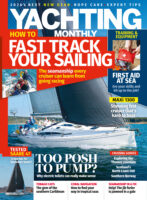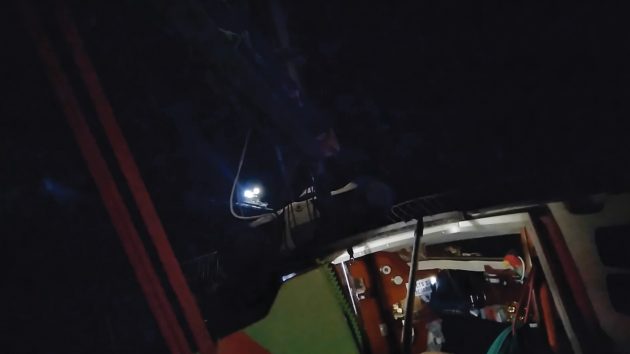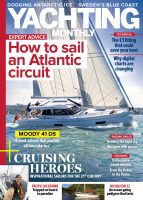When Tina McLachlan was caught by a 60-knot squall in the middle of the night and the anchors dragged, a grounding was just minutes away
Setting sail from the Black Sea my husband K and I have enjoyed wonderful journeys through the Bosphorus, Marmara, the Dardanelles and the Aegean, cruising south along the western Turkish coast on Diva, our 1989 Jeanneau Sunlight 30. The summer Meltemi winds have been particularly strong and gusting this year we were told, and it certainly seems that way. The last week has been very windy.
‘The holding’s a bit uncertain here, I think we should move on. What do you think?’ We sail gently out of pretty Bademli, but then in short order, the wind gets up again and is changeable and gusting.
We reef to a tiny genoa. We see the British and US boats we met in Ayvalik and they radio us. ‘How are you? We’ve had a few weather issues that got us questioning our life choices.’ ‘Absolutely, same here.’
The engine is still out of action and we’re en route to find parts and somewhere to get it repaired, so it’s a sail through quite a narrow channel, with lots of rocks and steep hillsides with flowing winds funnelling down them.
There’s a swirl of seagulls and herons high above one of the rocky hills. We decide to turn around, into a small bay on the other side of the island, hoping it will provide more protection. K manoeuvres the boat into the bay with great skill in the gusts with tiny reefed sail and no engine. We set and reset the two anchors we have been using lately a few times, trying to get good holding.
In the evening the wind calms a bit and the anchors seem to have set well. As we prepare something to eat, we hear a small engine as a fishing boat with a family aboard comes into the bay – we are amazed to see anyone in this remote, windy spot today. They call a mechanic for us and as it’s relatively calm, we agree he will come the next morning to either fix or tow us. Relieved that we’ve got something organised, we eat and settle to watch some TV before bedtime.
Herding cats
At 2300, as if from nowhere, giant gusts of howling wind lift us and both the anchors and carry us straight onto the rocks in a matter of minutes. At this point, there is nothing we can do – we have no engine, we’re in amongst the rocks and the wind is the strongest we’ve seen, so K radios the coastguard.
I pack the valuables, including the cat. As the boat smashes on the craggy shore, the saloon floor bows inwards with each blow. The vent cover for the fridge is mashed and broken by the lifting sole. The noise of the crashing, along with the wind and the battering waves is staggering. Then we sit on deck, in full gear and life jackets, Diva leaning to starboard, being smashed repeatedly against the rocks by wind and waves.
A strange calm descends over me. It passes midnight. ‘Happy anniversary’, says K, our 14th.
On the radio we hear, ‘Stand by, we’re coming. Can you see the lights? We can’t come closer, it’s very dangerous for us with the rocks and wind. Are you aground?’

Ava in a somewhat calmer moment
We can see the lights strobing some distance away, reflecting on the waves. ‘We will send a line remotely.’
We watch an orange remote-controlled unit, with its navigation lights flashing, zig zag towards us in the swell. K is hanging over with the boat hook to snag it, but it’s just too far away. He can’t reach it and it zig zags back to the lifeboat.
We sit waiting and can see lights strobing but the boat is out of sight, avoiding the rocks. The thumping, crashing, banging, whistling, roaring and torrents of water continue.
The RCU comes again and this time K catches it, takes the line from it and ties it to Diva’s bow. The coastguard start to move their ship forward to tow us off the rocks, but somehow the line detaches and my heart sinks as they move off into distance. On the radio, K says the line is lost, ‘OK, we’re coming back with another boat to get a line to you. Stand by’.
Article continues below…
Later a RIB arrives, comes closer to Diva and someone leaps aboard, a coastguard commander called Mahir. He and K tie a very thick yellow line onto Diva, around both the bow cleats and the windlass, in case the cleats are pulled out of the deck.
As they pull Diva, K and Mahir are thrown forward and both nearly fly off the bow, K managing to catch Mahir. Our spare anchor, a good Danforth, gets caught again and we have to cut it free. There’s nerve-jangling crashing as the RIB drags Diva off and through, the rocks.
‘What’s your name? OK Tina, your boat might sink as we pull it off the rocks and I don’t know if we can get your cat. You will have to get off, it’s dangerous on here, and onto the RIB.

Without an engine, a tow from the lifeboat (the bright working lights) was the only way to drag Diva off the rocks
The main thing we are doing is trying to stay alive. There is a fish farm around the corner, we may take your boat and tie her there, but we’re not sure as the weather is very bad. If she starts to sink, we will have to let her go’, explains Mahir.
As we are pulled into more open sea by the RIB, we surf up steep 10m waves and then slamming down into the deep throughs, as the sea pours over the deck.
‘Haide be!’ (come on!), I shout as a torrent of water blows over my head. Mahir laughs at my Turkish exclamation. In some ways, I’m glad it’s dark so I can’t see the full horror. ‘It’s very dangerous inside, stay on deck’, says Mahir.
The boathook is picked up by the wind and hits me on the side of the head. K heroically grabs Ava the cat from under the dinghy (this is not an easy task at the best of times) as she escaped from the carrier I had put her in earlier. We put her in a pillow case so we can get her off the boat with us. There’s no way Ava is being left behind.
We climb onto the bucking coastguard RIB vessel that is now alongside Diva. We sit for a minute, then we are told to get onto the much bigger vessel, ‘It’s too dangerous on here’. We clamber on; Welcome aboard’ says the captain.

The rudder was badly damaged and had to
be rebuilt
Staying Alive
The journey feels very slow and the weather is appalling but strangely warm. We bump and roll over the Aegean and as we come into Dikili, it’s slightly less windy. I catch sight of Diva; they have towed her with us. I am amazed to see her floating and so grateful for their efforts.
‘Listen, we have done our best with Diva but our aim is to keep everyone alive. It may be that she will sink. She was crashing on the starboard side as you know and again as we dragged
her out’. It’s about 0400 now, still dark, but the dawn is coming.
The coastguard team take the thick, yellow tow line from the boats and belay it out on the dock to hose it down – the Aegean is very salty. They are then immediately called out again to an immigrant boat with 44 Eritreans. Their boat sinks, but they are all saved.
‘This happens almost every day. We deal with a lot of dead bodies too’, they tell us.
We see another troubled yacht that had broken its moorings and was found out at sea by some fishermen. It transpires that hundreds were rescued that night. Later we return and Mahir is back. ‘You know, that wind last night was 60 knots – extremely dangerous. We all could have died. The weather has been unusually bad recently and we are called out at least four times every day.’
‘Can you take us to Greece?’ says one of the Eritreans nearby. ‘Sorry mate, we can’t take ourselves to Greece. That same storm nearly sank us too.’ Mahir’s phone rings. ‘I have to go again. There’s a big boat in trouble now’. ‘I’m so sorry’, I say. ‘Yes, me too’, he replies.
Lessons learned
Power of nature: The power and unpredictability of nature can’t be underestimated and we’ve since seen similar storms in Corsica and elsewhere. While being without a working engine it is difficult to see what we could have done differently in the circumstances we found ourselves in. It is a good reminder that even if you sail everywhere, a working motor is a useful safety device for getting yourself out of difficulties.
Call for help: As sailors we are used to being self-reliant, and don’t always like the idea of calling for help. Doing so before a situation deteriorates, however, increases the likelihood that the situation can be resolved successfully
Accepting a tow: We are very grateful for the skill and assistance of the Turkish Coastguard. Thanks also to Setur Marinas Ayvalik and Viya Marin. Knowing how to accept and rig a tow, and having deck gear that you know is up to the job makes a big difference. A tow breaking underway could spell a world of problems
Self-preservation: Put on your foul weather gear and life jacket in a storm! It’s no use otherwise and you can get cold quickly even when the water and the air are both warm.
Stay on board: Unless the boat sank beneath our feet, we were resolved to stay on board. While we had a life raft, getting into the water would have been far riskier, particularly when we could see so little in the darkness
Anchor setting: It goes without saying to ensure you check your anchor setting every time, but this was difficult for us with no engine. We put out two anchors, but perhaps we could also have put a line ashore. Perhaps it would have been possible to back her up on the main sail to check the anchor setting. In other circumstances, we would have anchored or moored elsewhere.
Enjoyed reading this?
A subscription to Yachting Monthly magazine costs around 40% less than the cover price.
Print and digital editions are available through Magazines Direct – where you can also find the latest deals.
YM is packed with information to help you get the most from your time on the water.
-
-
- Take your seamanship to the next level with tips, advice and skills from our experts
- Impartial in-depth reviews of the latest yachts and equipment
- Cruising guides to help you reach those dream destinations
-
Follow us on Facebook, Twitter and Instagram.






